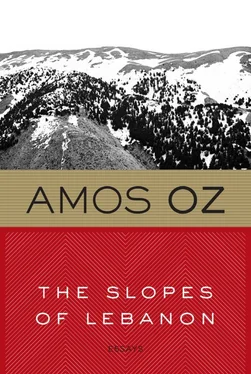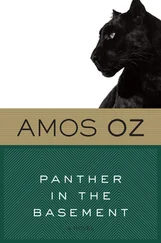When love uses language like this, it is a sign that the disease of violence has already filtered into the innermost tissues of our being. A sign that the war has stormed in and conquered even our beds. One who thinks and speaks of his beloved in such language… Better, perhaps, to leave this sentence unfinished. I want to emphasize that I am not talking about corruption of the language, but about blindness. Our language and, with it, our world are clouded by thick smoke.
The second thing that a writer or a poet may understand just a little better than many other people is what his fellow human being experiences. We writers, many of us, get up in the morning and, after a cup of coffee, begin to slip into the other fellow’s shoes. Or under someone else’s skin. A fundamental rule of the profession is the necessity to ask oneself the question: Suppose I were not I? Suppose I were he? or she? or the neighbor? or someone else — my spouse, or the enemy? In this respect the writer is not unlike a clever intelligence agent. Perhaps due to their habit of getting into the shoes and under the skin of others, many of the best poets and writers see the Israeli-Palestinian war not as a cheap Western in which the civilized good guys battle the savage, bloodthirsty natives, but as a Greek tragedy: right against right — although, as I have said, right against right does not mean, to me, an evenhanded distribution of the burden of guilt. The blame rests mostly with the Palestinian national movement. Nevertheless, even the guiltier side may be a victim of the tragedy. There are not — there have not been for some time — two separate tragedies, Israeli and Palestinian, but only one, a tragedy that envelops us all. Either we will be released from it together, through painful but intelligent compromise, or else we will perish in it together. We and they are bound together by thousands of threads, shackled together like a prisoner and his jailer. There already are elements of near intimacy in the hostile relations between us and them, including similarities that are peculiar, frightening, and sometimes almost ridiculous.
Let us return, for a moment, to the verse quoted by Chief Rabbi Eliyahu: “He raises the weak from the dust and lifts the poor from the dirt.” For the venerable Rabbi Eliyahu, the Israelis, incredibly, have become the Holy One, blessed by He Who lifts the poor ungrateful Arab out of the dirt. But I say to you that before there is peace, and particularly after there is peace, we will have to lift our own humanity out of the dirt. We will have to lift out of the dirt Judaism and Zionism, both of which have come so close to falling captive to their distorters.
I ask your forgiveness for not speaking here today of sweetness and light.
Note: The state appealed, in the Israeli Supreme Court, the lenient sentence handed down by Judge Uri Strosman in the case of Nissan Ishgoyev. The Supreme Court accepted the state’s arguments. On June 30, 1988, Nissan Ishgoyev was sentenced to three years in prison and two additional years on probation.

Born in Jerusalem in 1939, Amos Oz is the author of numerous works of fiction and essays. His international awards include the Prix Femina, the Israel Prize, and the Frankfurt Peace Prize, and his books have been translated into more than thirty languages. He lives in Israel.
* Likud is the major right-wing party in Israel and led the country from 1977 to 1984.
[back]
***
* Hafez al-Assad, born in 1928, has been president of Syria since 1971.
[back]
***
* Ariel Sharon, general, politician, and a leader of Likud, was minister of defense during the Lebanon War. Rafael Etan, also a general, was chief of staff 1978–1983.
[back]
***
* The Labor party, the major center/left-wing party in Israel, led the country from 1948 to 1977. Since 1984, it formed a “national unity” coalition with Likud and other parties.
[back]
***
* Gush Emunim is a spiritual-political movement that seeks to build Jewish settlements throughout the Israeli-occupied territories, in order to retain “greater Israel,” including the West Bank and Gaza. It consists mostly of religious Jews.
[back]
***
* In the Shatilla and Sabra refugee camps on the southern outskirts of Beirut, eight hundred Palestinian civilians were murdered by Lebanese Phalangist forces in 1982. In the worldwide uproar that followed, Israel was blamed for allowing the Phalangists to enter the camps.
[back]
***
* Hezbollah is a militant, armed Shiite group in Lebanon, sponsored by Iran.
[back]
***
* Jabotinsky (1880–1940), Zionist leader, novelist, poet, thinker. Born in Russia, he was one of the founders of Jewish self-defense groups during the Tsarist pogroms of 1903–1904; was an officer in the Jewish battalion of the British army in World War I; led the national-liberal faction of Zionism, 1925–1940. Jabotinsky was inspired by nineteenth-century European romantic nationalism.
[back]
***
* In 1956, during the Sinai campaign, 47 Arab citizens in the village of Kafr Kassem were shot by Israeli troops. The Israeli Supreme Court convicted the soldiers and their commanding officers, and ruled that a soldier was required by law to disobey a “clearly illegal order.”
[back]
***
* Green Line: The armistice lines between Israel and its Arab neighbors, 1948–1967.
[back]
***
* Juniyeh: a Christian suburb of Beirut notorious for its “dolce vita” during the Lebanese War while Christian forces were being battered by their Moslem enemies.
[back]
***
* Mea Shearim, one of the first Jewish neighborhoods built outside the walls of the Old City of Jerusalem (in 1874), is a stronghold of ultra-Orthodoxy.
[back]
***
* The Mitnagdim are non-Hassidic Jews.
[back]
***
* After the destruction of the Second Temple by the Romans, in A.D. 20, the small town of Yavneh, south of Jaffa, became the focus of Jewish religious and spiritual life. Yavneh symbolizes the moderate, realistic, and submissive trends in Judaism.
[back]
***
* The name Amalek represents a Canaanite tribe that attacked the Israelites in the wilderness (Exodus 17:8–16). The Lord instructed the Israelites to wipe Amalek from their memory. Amalek has come to signify an archetypal enemy of the Jews.
[back]
***
* The quotations from Shoah in this section are based on the author’s recollection; they were not taken verbatim from the film.
[back]













